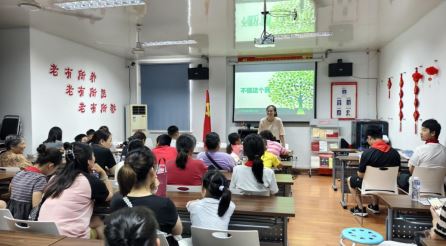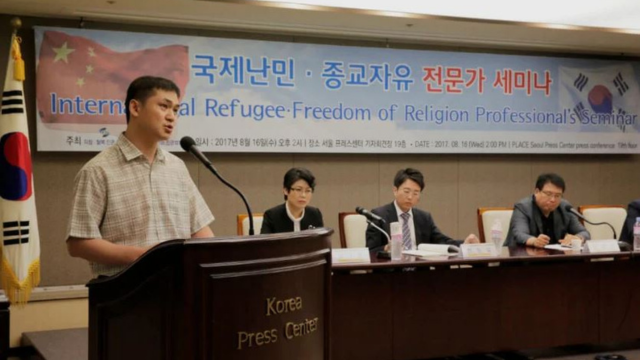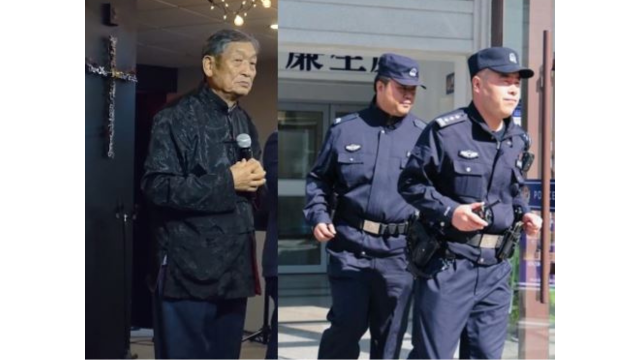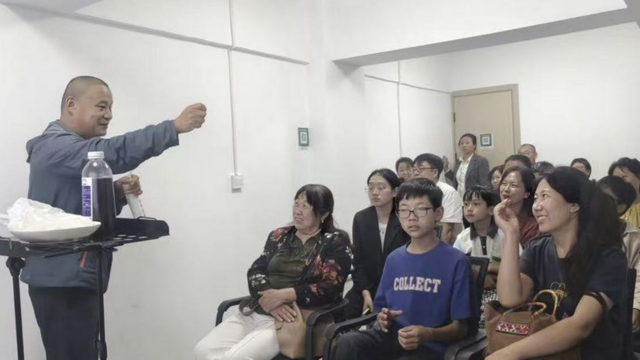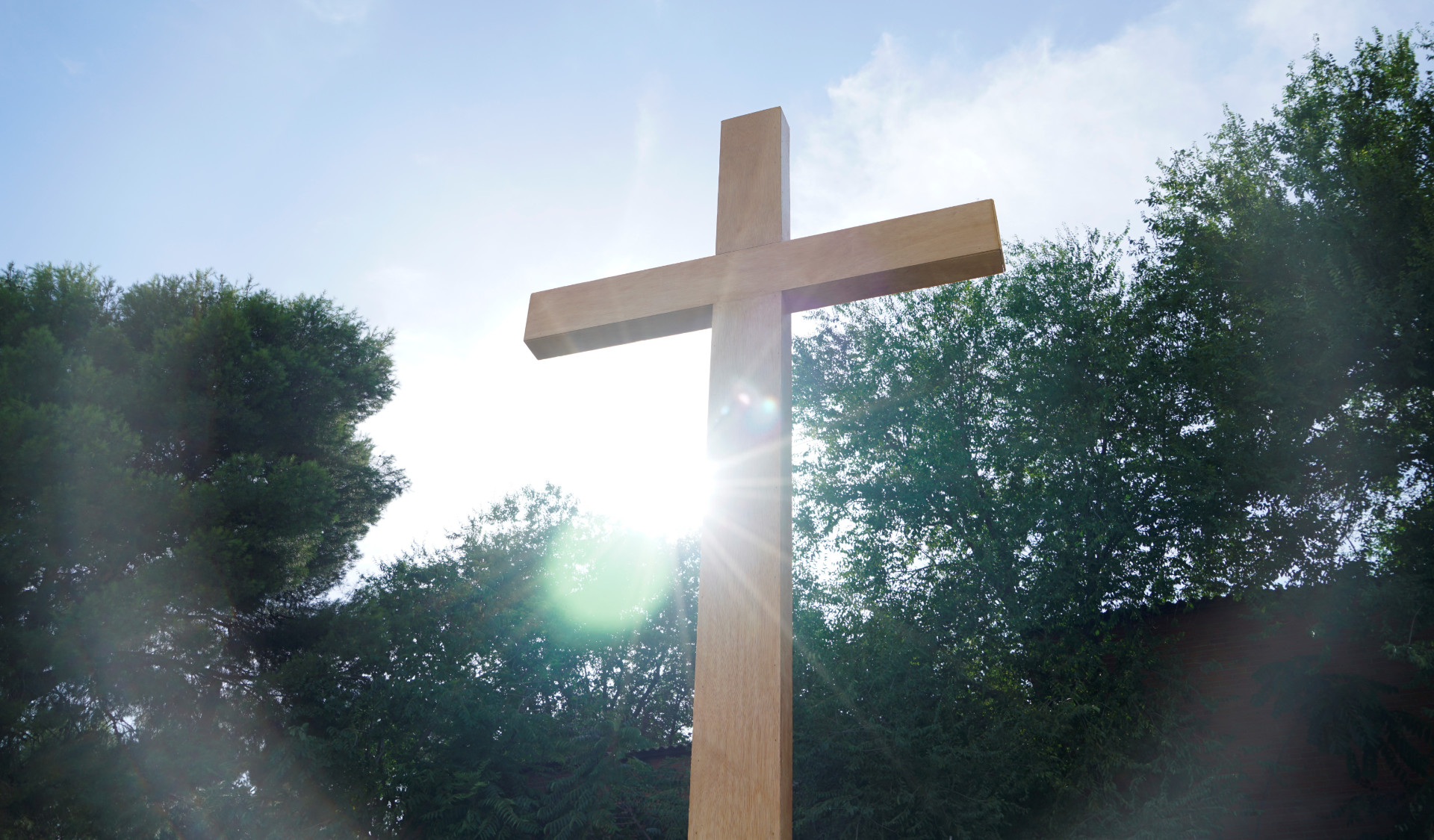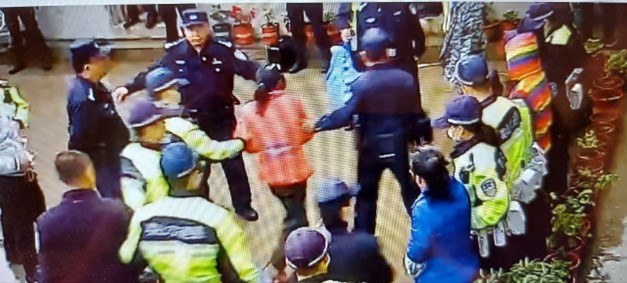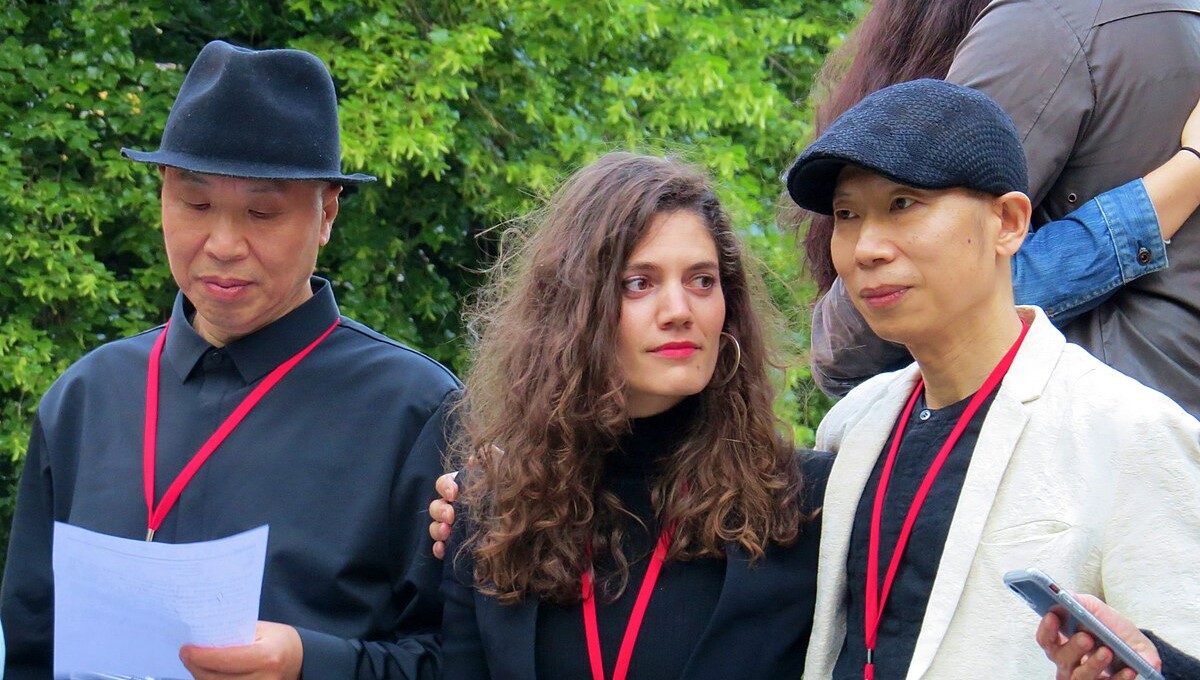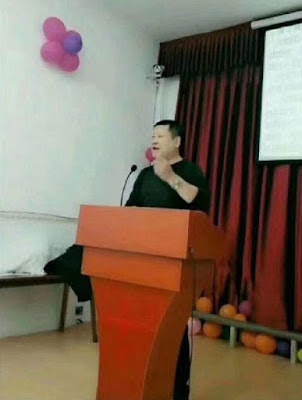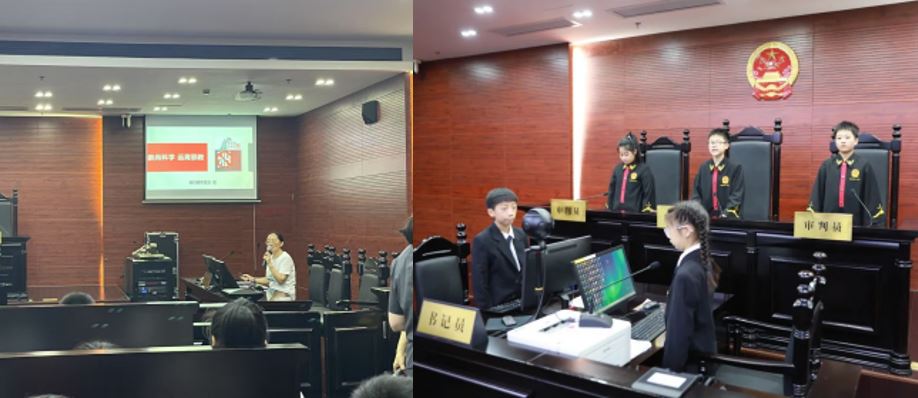Regulations published on September 15 significantly restrict religious content online. “Bitter Winter” provides a complete English translation of the rules.
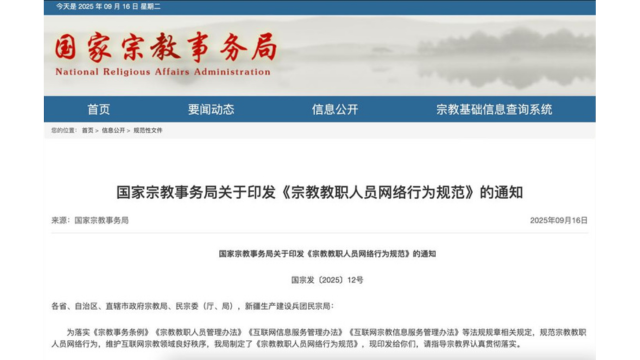
By now, it’s no surprise that China’s religious policy is less “freedom of belief” and more “freedom to believe what we tell you, quietly, offline, and preferably in Mandarin.” But the latest regulatory dispatch from the National Religious Affairs Administration—issued with the bureaucratic solemnity of a papal bull and the subtlety of a sledgehammer—takes the digital leash on clerical personnel to a new level of precision.
The document, published on September 15, is titled “Regulations on the Online Behavior of Religious Clergy” (宗教教职人员网络行为规范). It is an 18-article manifesto of what religious personnel may and may not do online. It resembles a hybrid of Confucian etiquette, cybersecurity policy, and Orwellian choreography. The tone is unmistakably paternal: “You may preach, but only through officially sanctioned channels. You may educate, but only on licensed platforms. And for heaven’s sake, don’t livestream your incense rituals.”
Let’s start with the basics. The regulation applies to all religious clerics operating within China—including those from Hong Kong, Macau, Taiwan, and even foreign clergy active on the mainland. A complete regulation translation is offered at the end of this article.
Online preaching and religious education are permitted only via platforms operated by registered religious organizations (temples, churches, seminaries) that hold a government-issued Internet Religious Information Service License. Personal social media accounts, livestreams, WeChat groups, or informal forums are strictly off-limits for religious instruction.
Self-promotion is banned, and clergy may not use religious identity to attract followers or traffic. Foreign entanglements are forbidden: no supporting or participating in “overseas religious infiltration.” Extremism and heresy are explicitly outlawed, including promotion of “xie jiao,” “superstitions,” or “non-mainstream” religious ideologies.
Targeting minors is prohibited. Clergy may not evangelize to underage users or organize youth religious camps or training. Commercialization is a no-go. There should be no fundraising, selling religious merchandise, or monetizing religious activities online. AI evangelism is also off the table. Clergy may not use generative AI to produce or disseminate religious content.
Violators may face administrative penalties, including suspension of religious credentials, closure of online accounts, and even criminal investigation. Platforms hosting non-compliant content may be ordered to restrict, warn, or shut down offending accounts.
The regulation is not just about behavior—it’s about ideological alignment. Clergy are required to uphold the leadership of the Communist Party, promote socialist values, and support the “Sinicization” of religion—a term that, in practice, means aligning religious doctrine with state ideology.
In other words, religious expression must be patriotic, party-friendly, and culturally sanitized, a “preaching with Chinese characteristics.”
While the document is couched in the language of “order” and “harmony,” its implications are stark. It effectively criminalizes spontaneous religious expression online, isolates clergy from global religious discourse, and places sacred speech under the watchful eye of state censors.
This is not the first time China has tightened its grip on religious life, but it may be one of the most technologically invasive. In the age of digital ministry, where sermons stream and prayers ping, the regulation feels like a deliberate attempt to unplug the sacred from the social.
The clergy may still speak—but only through the Party’s megaphone.
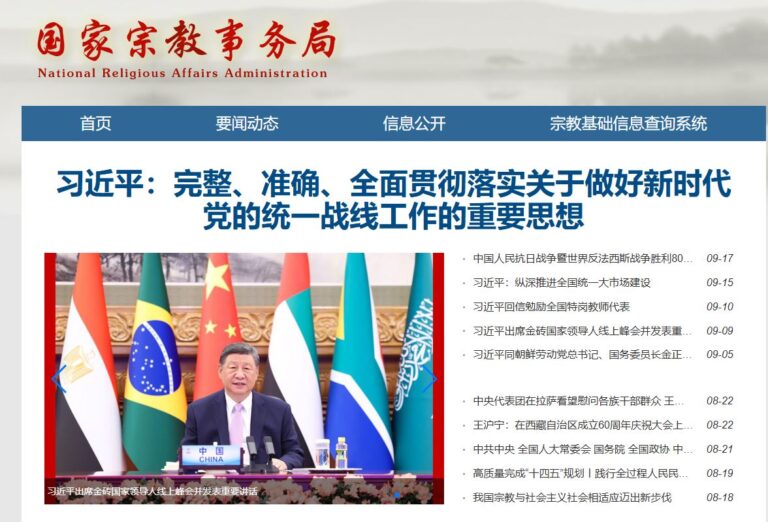
“Regulations on the Online Behavior of Religious Clergy”
Article 1: These regulations are established in accordance with the Regulations on Religious Affairs, the Measures for the Administration of Religious Clergy, the Measures for the Administration of Internet Information Services, the Measures for the Administration of Internet Religious Information Services, and other laws and regulations, to regulate the online conduct of religious clergy and maintain order in the internet religious field.
Article 2: Religious clergy engaging in online activities should love the motherland, support the leadership of the Chinese Communist Party, uphold the socialist system, follow national laws and regulations, and adhere to relevant provisions on managing religious affairs. They should observe social morality, maintain public order and good customs, set an example in complying with the “Self-Discipline Convention on Civilized Internet Use,” follow religious rules and regulations, and accept government supervision and social oversight.
Article 3: Religious clergy should uphold the core socialist values, follow the principle of independence and self-management of our country’s religions, adhere to the Sinicization of our country’s religions, actively guide religions to adapt to socialist society, and promote religious, social, and ethnic harmony when using the Internet.
Article 4: Religious clergy engaging in online activities outside their official capacity must follow national laws, regulations, and relevant rules on religious affairs management; when registering and using public online accounts for sharing information and instant messaging as religious clergy, they are required to submit their clergy certificates to internet service providers for verification.
Article 5: Religious clergy may only preach or provide religious education and online training through websites, applications, forums, and similar platforms that are legally established by religious groups, religious schools, temples, monasteries, and churches, and that have obtained an “Internet Religious Information Services License.”
Article 6: Religious clergy should develop good online habits, intentionally resist negative online culture, and must not self-promote or use religious topics and content to attract attention and traffic.
Article 7: All information produced, copied, stored, published, and shared by religious personnel via the internet must not contain content that incites subversion of state power, opposes the leadership of the Chinese Communist Party, undermines the socialist system, national unity, ethnic harmony, social stability, or interferes with the enforcement of national judicial, educational, marriage, and social management systems.
Article 8: Religious clergy must not collude with foreign forces over the internet, nor support or participate in foreign religious infiltration activities.
Article 9: Religious clergy must not display, wear, or promote extremist religious clothing online, spread extremist religious ideas, incite religious fanaticism, or promote extremism, terrorism, or ethnic separatism.
Article 10: Religious clergy must not spread religious ideas or induce religious beliefs in minors through the Internet, organize minors to participate in religious education and training, summer (winter) camps, or organize or force minors to participate in religious activities.
Article 11: Religious clergy shall not promote xie jiao or heretical Buddhist sects online, nor engage in feudal superstitions such as fortune-telling, divination, and astrology.
Article 12: Religious clergy shall not publish unverified false information online; they shall not incite discord, create confrontation, spread rumors, make false accusations, attack, or slander. They shall avoid destroying harmonious coexistence between different religions and within the same religion, and shall not discriminate against or insult religious or non-religious citizens.
Article 13: Except for the circumstances specified in Article 5 of these Regulations, religious clergy shall not preach through live broadcasts, short videos, online meetings, WeChat groups, WeChat Moments, etc.; shall not organize or participate in online religious activities such as ceremonies, worship, and masses, as well as religious rituals such as burning incense, offering to Buddha, chanting scriptures, receiving precepts, and baptism; and shall not carry out online learning and training with religious overtones or content, such as “meditation,” “purification,” and “healing.”
Article 14: Religious clergy must not use religion to generate income online; they must not solicit donations digitally in the name of building religious venues or conducting religious activities; they must not organize or engage in business activities such as product marketing, live streaming, offering rewards, or participate in commercial performances and performing arts activities.
Article 15: Religious clergy shall not distribute or share internal religious publications or illegal publications through the Internet.
Article 16: Religious clergy shall use generative artificial intelligence products and services per the law and must not use AI technology to preach, produce, publish, or disseminate illegal information or participate in illicit activities.
Article 17: If religious clergy violate these regulations, the Religious Affairs Department shall order them to correct their behavior within a specified period; if they refuse, the department shall, together with the Internet Information Office, the Telecommunications Department, public security organs, state security organs, and other relevant departments, impose penalties according to applicable laws and regulations. In severe cases, the department shall recommend that the relevant religious group, religious school, or activity venue suspend their religious activities or revoke the clergy’s status, holding accountable those responsible. If violating clergy are registered users on an online religious information platform, the department shall collaborate with the Internet Information Office and public security organs to require the platform provider to take measures such as warnings, corrections, restrictions, or account closures in accordance with law and contract.
Article 18: Religious clergy who engage in online activities through overseas website platforms must comply with these regulations. Religious clergy from Hong Kong, Macao, and Taiwan, as well as foreign religious clergy, should refer to these regulations when conducting online activities within the country.
Source: Bitter Winter



